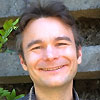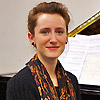Jack Body Interview - Page 3
The turning point I suppose was that Percy Grainger prize ... I was a third year student doing orchestration for the first time when I wrote this piece called Forest and put it in, and to my astonishment a few months later a reporter and a photographer turned up on the doorstep. After that it was fame. You know the sweet taste of fame, never had it so good since. It gave me 25 pounds. What that was worth in those days I don't know, but it was enough to impress my family that there might be a bit of money in it you know. Not only that but my father had a letter from the President of the Farmers' Union congratulating him on his son's musical success. And I think it shook him a bit because he couldn't believe it. He used to say, if it had to be music couldn't it be the bagpipes!...
Yes, my father agreed to send me to London to study on the strength of this Percy Grainger prize. He agreed to give me an allowance of three pounds a week, which wasn't lavish. And he gave me a two-berth cabin to go in because he thought his brother who might be in Auckland might come to see me off -I wasn't going to be seen off in anything less than a two-berth cabin. And so off I went in July '37. It took six weeks I think on the old Ruahine, and I arrived in London and got myself established somehow... I had roughly two-and-a-half years in London, two-and-three-quarter years I think. I studied piano, composition, orchestration, sixteenth century counterpoint, conducting, at the Royal College...
Other Students? Oh yes, I was very conscious in my final year at the College which was 1939 that Denis Dowling won the Tagore Medal for the best student in the college, operatic singer; that Cecilia Keeting from the West Coast was leading the first orchestra; that Alex Lindsay was very prominent violinist there; Colin Horsley was a premier pianist there; and that I won the Cobbett Prize for composition - and I thought for a couple of little islands way down under it was really pretty good.
And so I arrived home to find that I had won three out of four Centennial competitions. Was anybody in the universities, was anybody in my family impressed? Oh no! They more or less conveyed to me that I was still no good as a farmer -that if I had been any good as a musician I wouldn't have come home.
So bless them, I did a year on the farm in Taihape - my sister's farm because her husband had gone off to the war. That was an extraordinary experience. Sheep farming. Well, I arrived there in the pouring rain. I was dropped off at the gate and had to climb a hill lugging my suitcase... I was delegated to do the milking. I lived in a tin whare just across from the house. At six o'clock the alarm clock would go off and wake the girl who would pick up a piece of scrub and heave it at the roof of my whare. This was my signal. I'd get up and get dressed quickly and go round behind the Macrocarpa hedge and find these two old milk cows and stir them into life with a shoo. You know it took a good deal of tact and persuasion. I mean you had to wake them up and sort of get them up on their rheumatic knees and wait while they stretched their tails out and did their job and then they were ready to move off into the bail. You couldn't hurry any of this, and it was very instructive. I used to do the milking and then come in for breakfast. Then I used to catch my horse and ride round. I had about 800 ewes you know, expectant mothers to keep an eye on, and this used to take till about two o'clock in the afternoon, and get home to have a bit of lunch and then do odd jobs and cut firewood. I used to have to do awful things like kill a sheep for household use, or kill a sheep for dog tucker. I simply did this because it had to be done. But when I killed the last one before I came away I vowed I would never cut another animal's throat. Those unanswerable questions. On the other hand if you've seen animals dying from natural causes as I saw frequently on the farm you would think it an act of mercy to cut their throats quickly...
In the middle of that year I was invited by Broadcasting to come down and conduct the String Orchestra which Maurice Clare had formed, because Maurice had gone off to farm in Canterbury. And so I was guest conductor there for three months and then after that I went back to Christchurch and I was very lost... I just knew what I didn't want to do, and gradually I picked up the old Christchurch context I'd known and it was a very good one indeed. I did occasionally teach if anyone turned up on the doorstep who wanted a lesson. There was Gerald Christeller who would come for a singing lesson, or Gwyneth Brown for a harmony lesson, and that dear Maisy Kilkelly, my best ever student, who would come for a harmony lesson, would arrive in a taxi and rush in with a cheque and say I'm terribly busy I can't come today!
So I sort of survived in Christchurch for many years. I had a little bit of capital and I earned a bit. I did odd jobs for Broadcasting like arranging things for string orchestra, Mozart four-handers, occasional conducting of the 3YC orchestra, and I did press criticism. Oh yes, I enjoyed it, but I got to be the most hated person very quickly.









